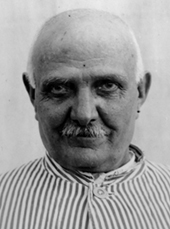Search for Names, Places and Biographies
Already layed Stumbling Stones
Suche
Josef Kubiak * 1869
Venusberg ggü. Nr. 22 (vormals Nr. 33) (Hamburg-Mitte, Neustadt)
HIER WOHNTE
JOSEF KUBIAK
JG. 1869
EINGEWIESEN 1939
ALSTERDORFER ANSTALTEN
"VERLEGT" 1943
HEIL- UND PFLEGEANSTALT
MAINKOFEN
TOT 29.5.1944
Josef Kubiak, born on 2 July 1869 in Roski (Province of Posen, today in Poland), admitted on 8 Feb. 1939 to what was then the Alsterdorf Asylum (Alsterdorfer Anstalten), transferred on 10 Aug. 1943 to the Mainkofen "sanatorium and nursing home” (Heil- und Pflegeanstalt Mainkofen) in Lower Bavaria, died on 29 May 1944
Venusberg opposite house no. 22 (Venusberg 33)
Josef Kubiak was the son of Simon and Hedwig Kubiak. He had grown up in a Catholic family in Roski (Province of Posen). After finishing the eight-grade elementary school (Volksschule), he had worked for his father in agriculture, interrupted by a three-year military service. In 1893, he left his homeland and came to Hamburg, where he first found work as a construction, excavating, and road worker. At the beginning of the First World War, he volunteered, and after his return, he became a lighterman (Ewerführer, an Ewer being a type of small sailing boat). At the age of 68, Josef Kubiak was still working in the port of Hamburg. Since 1937, the unmarried pensioner lived at Venusberg 33 as a subtenant of Mrs. Lenz.
On the evening of 31 Aug. 1938, his landlady was at the end of her tether and called the police, as her subtenant was wandering around the apartment in a "mentally disturbed state.” At the urging of a doctor, Josef Kubiak was admitted to the Eilbektal "Psychiatric and Mental Hospital of the Hansische University” ("Psychiatrische und Nervenklinik der Hansischen Universität”). When interviewed by the physicians, he stated that for two years, after finishing his professional career, he had been hearing voices and feeling influenced by telepathy and X-rays, about which he was not allowed to speak, however. On 8 Feb. 1939, Josef Kubiak was transferred to the Langenhorn "sanatorium and nursing home” as a "nursing case” with the diagnosis of "schizophrenic phase” and from there, he was discharged on 28 August as "uncured” to the former Alsterdorf Asylum (Alsterdorfer Anstalten, today Protestant Alsterdorf Foundation [Evangelische Stiftung Alsterdorf]). Josef Kubiak was described as quite sprightly for his age. Already in Langenhorn, he had been assigned to a gardening column. A "collecting impulse” was mentioned in his file, and since he often made the sign of the cross, he was considered religious. His temporary "impairment ideas” were attributed to arteriosclerosis. However, he replied to questions in a logical way and "does not cause any difficulties otherwise.”
Regardless of his advanced age, by then 74 years, it was noted in Mar. 1943 that he was not capable of any "useful” work in "Alsterdorf.” Whereas during the first phase of "euthanasia” of the so-called "Operation T4” ("Aktion T4”), participation in the First World War was still regarded as a grounds for exemption, this no longer played a role in patient registration during the second phase, later referred to as "wild euthanasia.”
On 10 Aug. 1943, Josef Kubiak arrived at the Mainkofen "sanatorium and nursing home” near Deggendorf on a collective transport in which there were a noticeably large number of older men among the 113 patients. In the Lower Bavarian institution, deliberate "starvation diet” ("Hungerkost”) was administered, which, in interaction with infectious diseases, was probably decisive for the high mortality rate. Just in the cases of 74 former Alsterdorf patients alone, pulmonary tuberculosis was cited as the cause of death until 1945. This also applies to Josef Kubiak, who died ten months after his transfer on 29 May 1944. It is more probable, however, that he became a victim of the "starvation diet” and the dreadful conditions at the Mainkofen "sanatorium and nursing home.”
Translator: Erwin Fink
Kindly supported by the Hermann Reemtsma Stiftung, Hamburg.
Stand: May 2020
© Susanne Rosendahl
Quellen: Archiv Evangelische Stiftung Alsterdorf, Patientenakten der Alsterdorfer Anstalten, V 471 Josef Kubiak; Wunder: Exodus, S. 205–211; http://www.mainkofen.de/209.html (Zugriff 24.11.2016).


